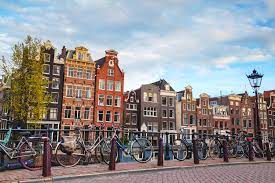Are you planning to move to the Netherlands with a moving company? Before you pack your bags, it’s essential to understand the customs procedures in the Netherlands to ensure a smooth transition. Navigating Dutch customs can be a daunting task, but with the right information, you can avoid unnecessary delays and extra fees. In this article, we will guide you through the customs procedures in the Netherlands, from required documentation to prohibited items.
Why Do You Need to Clear Customs When Moving to The Netherlands?
Customs clearance is a mandatory process for all goods entering the Netherlands from outside the EU. The Netherlands is part of the European Union, which means that the customs procedures for goods entering the country from other EU member states are less stringent. However, for goods coming from outside the EU, customs clearance is a necessary requirement to ensure compliance with Dutch customs regulations. Some local movers kan help you with the regulations.
The purpose of customs clearance is to prevent illegal or harmful goods from entering the country and to ensure that appropriate taxes and duties are paid on imported goods.
What Documentation Do You Need for Customs Clearance in The Netherlands?
To clear customs in the Netherlands, you need to provide the following documents:
1. Bill of Lading
The Bill of Lading is a document that details the goods being shipped, their origin, and the destination. It acts as a receipt for the shipment and is issued by the shipping company.
2. Packing List
The packing list is a detailed list of all the items being shipped. It includes the quantity, description, and value of each item. This document helps customs officials determine the appropriate taxes and duties.
3. Commercial Invoice
The commercial invoice is a document that contains the details of the sale, including the price and terms of the transaction. It helps customs officials determine the appropriate taxes and duties.
4. Residence Permit
If you are a non-EU citizen, you will need a valid residence permit to clear customs in the Netherlands.
5. Passport
You will need a valid passport to clear customs in the Netherlands.
How to Declare Your Goods for Customs Clearance in The Netherlands?
When you arrive in the Netherlands with your goods, you must declare them to customs officials. You can do this in one of two ways:
1. Through the Customs Declaration Portal
The Customs Declaration Portal is an online platform that allows you to declare your goods to customs officials before you arrive in the Netherlands. This option is recommended for individuals with a large number of items or high-value items.
2. At the Customs Office
If you prefer, you can declare your goods in person at the customs office. To do this, you will need to bring all the required documents, including the bill of lading, packing list, commercial invoice, residence permit, and passport.
Prohibited and Restricted Items in The Netherlands
Certain items are prohibited or restricted from entering the Netherlands. These include:
1. Drugs
All forms of drugs, including marijuana, are illegal in the Netherlands. Attempting to import drugs can result in fines or imprisonment.
2. Firearms
Firearms are heavily regulate in the Netherlands. You must have a valid license and permit to bring firearms into the country.
3. Endangered Species
It is illegal to import products made from endangered species, such as ivory and certain types of wood.
4. Counterfeit Goods
Importing counterfeit goods is prohibited and can result in legal action.
5. Food Products
Certain food products, such as meat and dairy, are restricted from entering the Netherlands due to health and safety concerns.
Taxes and Duties in The Netherlands
When importing goods into the Netherlands, you may be required to pay taxes and duties. The amount you pay depends on the value and type of goods being imported. In general, the following taxes and duties apply:
1. Value-Added Tax (VAT)
The VAT rate in the Netherlands is 21%. You will require to pay VAT on the value of your imported goods.
2. Customs Duty
Customs duty is a tax on certain importe goods. The amount you pay depends on the type of goods being importe.
3. Excise Duty
Excise duty is a tax on certain goods, such as tobacco and alcohol. The amount you pay depends on the type and quantity of goods being importe.
Common Mistakes When Clearing Customs in The Netherlands
Clearing customs in the Netherlands can be a complex process, and there are several common mistakes to avoid. These include:
1. Failing to Declare All Goods
It is essential to declare all goods being importe, as failing to do so can result in fines or legal action.
2. Providing Incomplete or Incorrect Documentation
Providing incomplete or incorrect documentation can result in delays or additional fees.
3. Attempting to Import Prohibited or Restricted Items
Attempting to import prohibited or restricted items can result in fines or legal action.
Choosing the Right Moving Company for Your Move to The Netherlands
Choosing the right moving company is crucial to ensuring a smooth and successful move to the Netherlands. When selecting a moving company, consider the following factors:
1. Experience
Choose a moving company with experience in international moves, particularly to the Netherlands.
2. Licensing and Certification
Ensure that the moving company licens and certified to operate in the Netherlands.
3. Insurance
Make sure that the moving company offers insurance to protect your goods during transit.
Conclusion
Clearing customs in the Netherlands is a necessary requirement when importing goods from outside the EU. Understanding the customs procedures and regulations can help ensure a smooth and successful move. By following the guidelines outlined in this article, you can avoid common mistakes and navigate Dutch customs with ease.

